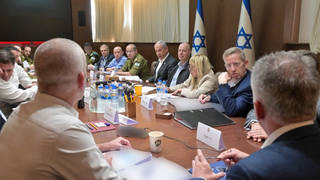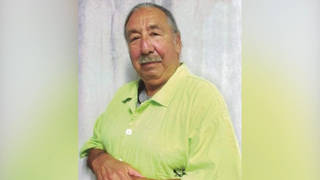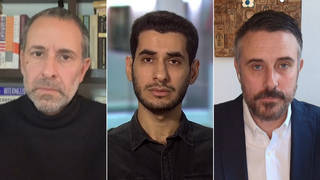
Related
Guests
- Rashid KhalidiEdward Said professor of Arab studies at Columbia University. He’s the author of several books, including his latest, Brokers of Deceit: How the U.S. Has Undermined Peace in the Middle East.
Wednesday marked a historic day for Palestine at the United Nations in New York, where the Palestinian flag was raised for the first time. Earlier this month, the U.N. General Assembly passed a motion to raise the Palestinian and Vatican flags. The United States and Israel voted against the motion, along with six other countries. Forty-five countries abstained. Earlier on Wednesday, Palestinian President Mahmoud Abbas announced in his address to the U.N. General Assembly that the Palestinian Authority was no longer bound by the peace agreements known as the Oslo Accords with Israel. We speak to Columbia University professor Rashid Khalidi, author of many books, including “Brokers of Deceit: How the U.S. Has Undermined Peace in the Middle East.”
Transcript
NERMEEN SHAIKH: Well, on another note, Wednesday marked a historic day for Palestine at the United Nations in New York, where the Palestinian flag was raised for the first time. Earlier this month, the U.N. General Assembly passed a motion to raise the Palestinian and Vatican flags. The United States and Israel voted against the motion, along with six other countries. Forty-five countries abstained. Earlier on Wednesday, Palestinian President Mahmoud Abbas announced in his address to the U.N. General Assembly that the Palestinian Authority was no longer bound by the peace agreements known as the Oslo Accords with Israel.
PRESIDENT MAHMOUD ABBAS: [translated] Here we declare that as long as Israel refuses to commit to the agreements signed with us, which renders us an authority without real powers, and as long as Israel refuses to cease settlement activities and to release the fourth group of Palestinian prisoners in accordance with our agreements, Israel leaves us no choice but to insist that we will not remain the only ones committed to the implementation of these agreements, while Israel continuously violates them. We therefore declare that we cannot continue to be bound by these agreements and that Israel must assume fully all of its responsibilities as an occupying power, because the status quo cannot continue, and the decisions of the Palestinian Central Council last March are specific and binding. As long as Israel is not committed to the signed agreements and undermines all agreements, we, for our part, are not committed to those agreements, and Israel must bear full responsibility for this situation.
AMY GOODMAN: Israeli Prime Minister Benjamin Netanyahu’s office said Abbas’s speech was, quote, “deceitful and encourages incitement and lawlessness in the Middle East.” Netanyahu is scheduled to address the General Assembly later today. Still with us, Professor Rashid Khalidi, the Edward Said professor of Arab Studies at Columbia University. Talk about what took place yesterday and what it means, what Mahmoud Abbas said about Oslo.
RASHID KHALIDI: Well, both of the things that happened at the U.N. yesterday, the Abbas speech and the raising of the flag, are purely symbolic. Symbols sometimes have a meaning. That speech will only have a meaning if it’s translated into concrete action by the Palestinian Authority in halting a security cooperation with Israel. The only part of the Oslo Accords that ever was really faithfully implemented was the protection that the Palestinian Authority has provided to Israel’s occupation and settlement enterprise. That is the core of the Oslo Accords. The Oslo Accords did not lead, were not meant to lead, to self-determination or independence or statehood. They were not meant to really be what the Palestinians thought—some Palestinians thought they would be. They were meant to provide protection for Israel’s continued occupation and settlement regime.
And unless and until the Palestinian Authority ceases to do that—it, in fact, is still implementing its side of the Oslo Accords, which Israel has, from the beginning, never implemented, whether on the economic level, whether as far as conditions in Jerusalem are concerned, whether in myriad other spheres. Israel has subtly and in some cases very brutally pulled back from what was originally committed—what it originally committed to do. So the only party really obeying anything important, as far as the Oslo Accords are concerned, is the Palestinian Authority. And unless and until they actually cease to do those things, this will be a purely symbolic gesture.
NERMEEN SHAIKH: Well, White House spokesperson Josh Earnest was asked Wednesday about Abbas’s speech. He reiterated the need for a two-state solution.
PRESS SECRETARY JOSH EARNEST: The United States has long been and continues today to be committed to achieving peace that the Palestinians and Israelis deserve. And we have described the resolution of this conflict as a two0state solution, that results in two states for two peoples, with a sovereign, viable and independent Palestinian state living side by side in peace and security with a Jewish and democratic Israel. That’s been our position for quite some time, and that continues to be our position today.
NERMEEN SHAIKH: Rashid Khalidi, right before we end, what do you think needs to happen now?
RASHID KHALIDI: Well, meaningless American words need to be turned into action. The United States pays for, arms and diplomatically protects continued occupation. Those are meaningless words. The United States has done nothing to help establish a Palestinian state, end the occupation or stop the creeping, metastasizing settlement process that’s just taking over—that’s taken over more than the land—more than half of the land of the West Bank and Jerusalem.
What needs to be done is the external support, without which this occupation and settlement regime could not continue, has to be halted. And most of that support comes from the United States and Europe. So, the Americans and the Europeans, instead of continuing to mouth meaningless, pious platitudes about their support for peace and a Palestinian state, could actually stop supporting occupation and settlement, which are what prevents peace and an end to this occupation and this settlement.
AMY GOODMAN: Well, Rashid Khalidi, we thank you very much for being with us. We know you have to head off to do your job, which is to teach your students. He’s speaking to us from Columbia University, where he’s the—
RASHID KHALIDI: And I’m late for class, actually.
AMY GOODMAN: We’ll give you a late excuse. He is the Edward Said professor of Arab studies at Columbia University, the author of a number of books, including his latest, Brokers of Deceit: How the U.S. Has Undermined Peace in the Middle East, again, speaking to us from Columbia University. He is a Palestinian-American professor.
This is Democracy Now!, democracynow.org, The War and Peace Report. We’ll be back, talking about Planned Parenthood and then to Oklahoma with anti-death-penalty activist Sister Helen Prejean to talk about the Richard Glossip case, in a moment.











Media Options